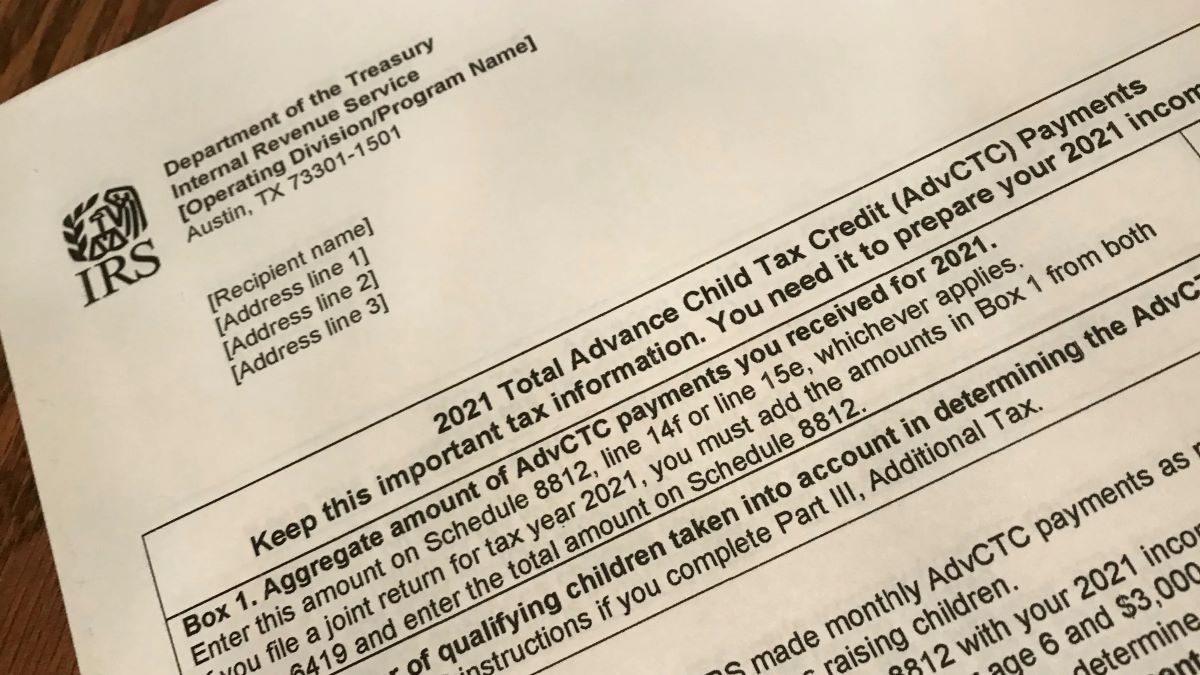

Finance
How To Change Address On Credit Report
Published: October 21, 2023
Learn how to change your address on your credit report with our comprehensive guide. Ensure your financial information is up to date for better financial management.
(Many of the links in this article redirect to a specific reviewed product. Your purchase of these products through affiliate links helps to generate commission for LiveWell, at no extra cost. Learn more)
Table of Contents
- Introduction
- Why is it important to change your address on your credit report?
- Step-by-step guide on changing your address on your credit report
- Contacting the credit bureaus to update your address
- Updating your address with your creditors
- Documentation required for changing your address on your credit report
- Common challenges and tips for updating your address on your credit report
- Frequently Asked Questions (FAQs) about changing your address on your credit report
- Conclusion
Introduction
Changing your address on your credit report is an important step to ensure that your credit information is up to date and accurate. Your credit report contains crucial information that lenders and financial institutions use to assess your creditworthiness. It includes details such as your personal information, account balances, payment history, and more.
When you move to a new address, it is essential to update this information on your credit report to avoid any misunderstandings or delays in future financial transactions, such as applying for a loan, credit card, or even renting a new apartment. Failing to update your address may result in missed bills or important financial notices, which can negatively impact your credit score and financial reputation.
In this article, we will guide you through the process of changing your address on your credit report. We will provide a step-by-step approach, including contacting credit bureaus and updating your address with your creditors. We will also discuss the required documentation and address common challenges that individuals often face when updating their address on their credit report.
By following this guide, you can ensure that your financial records reflect your current address, keeping your credit report accurate and helping you maintain a healthy credit profile.
Why is it important to change your address on your credit report?
Updating your address on your credit report may seem like a minor task, but it plays a significant role in maintaining your financial health. Here are a few reasons why it’s important to change your address on your credit report:
- Ensure accurate communication: When you move to a new address, it’s crucial to receive your financial statements, bills, and other important communications from your creditors. By updating your address, you can ensure that these documents reach you on time, preventing missed payments and potential negative marks on your credit report.
- Prevent identity theft: Your credit report contains sensitive personal information. By keeping your address up to date, you reduce the risk of identity theft. If your address is not correct, you may not receive alerts about suspicious activity on your accounts, leaving you vulnerable to fraudulent actions.
- Improve loan and credit card applications: Lenders and financial institutions rely on accurate information when assessing your creditworthiness. A mismatched address can raise red flags and cause delays in loan or credit card applications. Updating your address ensures that your financial records align with the information provided in your applications, preventing unnecessary hurdles.
- Avoid confusion with existing credit accounts: If your address is not updated on your credit report, it can create confusion for your existing creditors. They may send important correspondence or notifications to your old address, leading to miscommunication and potential complications with your accounts.
- Maintain an accurate credit history: Your credit report is a reflection of your financial history and behavior. By updating your address, you ensure that your credit report accurately represents your current situation. This is crucial for future financial transactions, as lenders will rely on this information to make decisions about your creditworthiness.
Overall, changing your address on your credit report is essential for maintaining clear communication with your creditors, protecting yourself against identity theft, and ensuring the accuracy of your financial history. It is a simple yet important step in managing your credit effectively and maintaining a healthy credit profile.
Step-by-step guide on changing your address on your credit report
Changing your address on your credit report is a relatively straightforward process. Follow these steps to ensure that your address is accurately reflected on your credit report:
- Contact the credit bureaus: Start by reaching out to the major credit bureaus, namely Equifax, Experian, and TransUnion. You can request an address change by phone, mail, or through their online portals. Provide them with your updated address and any relevant supporting documentation they may require, such as a utility bill or a government-issued identification card.
- Update your address with your creditors: Notify your existing creditors about your address change. This can be done by contacting them directly through phone, email, or their online account portals. Provide them with your new address and any necessary documentation. It’s important to update your address with all your creditors, including credit card companies, banks, mortgage lenders, and any other institutions that you have open accounts with.
- Verify the update: After updating your address, follow up with the credit bureaus and your creditors to verify that the changes have been made successfully. Review your credit reports from each bureau to ensure that your new address is reflected accurately.
- Monitor your mail: Once you have updated your address, keep an eye on your mail to ensure that your financial statements, bills, and other important communications are being sent to the correct address. If you notice any issues or missing documents, contact the respective creditors and credit bureaus immediately to address the situation.
- Regularly review your credit report: Keep track of your credit report by regularly reviewing it to ensure the accuracy of your personal information, including your address. You can pull a free copy of your credit report from each of the major credit bureaus once a year through annualcreditreport.com. If you find any errors or discrepancies in your address or other information, dispute them with the credit bureaus to have them corrected.
By following these steps and staying proactive in updating your address with the credit bureaus and your creditors, you can ensure that your credit report reflects your current address accurately. This will help you maintain clear communication, protect against identity theft, and enable smooth financial transactions in the future.
Contacting the credit bureaus to update your address
When you need to update your address on your credit report, it is essential to contact the major credit bureaus: Equifax, Experian, and TransUnion. Here’s a step-by-step guide on how to reach out to them to update your address:
- Identify the official websites: Visit the official websites of Equifax, Experian, and TransUnion to find the contact information and address update options. These websites provide valuable resources and instructions for updating your address on your credit report.
- Choose your preferred method of contact: Decide how you want to communicate with the credit bureaus. You can typically update your address through various methods, including phone, mail, or their online portals. Choose the option that is most convenient for you and fits your preferences.
- Compile the necessary information: Before contacting the credit bureaus, gather the relevant information you will need to update your address. This may include your Social Security number, previous address, new address, and any supporting documentation that they may require, such as a utility bill or a government-issued identification card.
- Place a phone call: If you prefer to speak with a representative, find the phone number provided on the credit bureaus’ websites. Be prepared to provide your personal information and follow the instructions given by the representative to update your address.
- Send a written request: If you choose to update your address by mail, write a formal letter to each credit bureau stating your request. Include your personal information and supporting documents, if required. Make sure to send the letters via certified mail with a return receipt, so you have proof of the correspondence.
- Utilize the online portals: Many credit bureaus offer online portals where you can create an account and manage your credit information. Log in to the respective portals and navigate to the address update section. Follow the provided instructions to submit your new address details.
- Verify the update: After contacting the credit bureaus, it is important to follow up and verify that your address has been updated on your credit report. You can do this by requesting a free copy of your credit report from each bureau to ensure that your new address is accurately reflected.
Remember to keep a record of all communication and correspondence with the credit bureaus regarding your address update. This will help you if any issues arise in the future.
By contacting the credit bureaus and providing the necessary information through your preferred method of communication, you can ensure that your address is updated on your credit report, helping you maintain accurate financial records and smooth communication with lenders and creditors.
Updating your address with your creditors
In addition to contacting the credit bureaus, it’s essential to update your address directly with your creditors. Here’s a step-by-step guide on how to update your address with your creditors:
- Create a list of your creditors: Start by making a comprehensive list of all the creditors you currently have open accounts with. This may include credit card companies, banks, lenders, utility providers, subscription services, and any other institutions that send you bills or have your address on file.
- Check their preferred methods of communication: Visit the websites of each creditor or refer to their statements to determine their preferred methods of communication. This could be phone, email, postal mail, or through their online account portals.
- Update your address by phone or online: Contact each creditor individually and inform them of your address change. Provide them with your updated address details and any necessary documentation they may require. Many creditors have dedicated customer service lines or online account options where you can easily update your address information.
- Send written notifications: Some creditors may require a written notification of address change. In such cases, submit a formal letter stating your address update request. Include your account details, old address, new address, and any supporting documentation they may need. Send the letter via certified mail with a return receipt to ensure it reaches the correct department.
- Update recurring payment information: If you have any automatic recurring payments set up with your creditors, such as for mortgage or utility bills, don’t forget to update your address in their payment systems. This will ensure that your bills are sent to your new address and processed without any interruptions.
- Follow up and confirm: After submitting your address change requests, follow up with each creditor to ensure that the updates have been made successfully. Double-check that your new address is reflected correctly on your accounts and that you will receive future correspondence at your new address.
Updating your address with your creditors is crucial to maintain clear communication and avoid any issues with your accounts. By following this step-by-step guide and ensuring that all your creditors have your updated address, you can minimize the risk of missed bills, late payments, and other potential complications that could negatively impact your credit report.
Remember that updating your address with the credit bureaus and your creditors may take some time to be fully reflected on your credit report and in their systems. Patience and regular monitoring of your accounts and credit report are key to ensuring a smooth transition to your new address.
Documentation required for changing your address on your credit report
When you need to update your address on your credit report, it is important to have the necessary documentation ready to ensure a smooth process. While the exact requirements may vary depending on the credit bureau and specific circumstances, here are some commonly requested documents:
- Proof of identification: Credit bureaus typically require some form of identification to verify your identity. This may include a copy of your driver’s license, passport, or other government-issued identification.
- Proof of address: To update your address, you will need to provide proof of your new address. This can be done with documents such as a recent utility bill, lease agreement, or a bank statement. Make sure the document clearly displays your name and new address.
- Social Security number: You will often be asked to provide your Social Security number to verify your identity when updating your address on your credit report. This information helps ensure that the address change is being requested by the correct individual.
- Credit report reference number: In some cases, when contacting the credit bureaus, you may be asked to provide a reference number from your credit report. This number helps the bureau identify your specific credit file and expedites the address update process.
- Proof of name change (if applicable): If you have recently changed your name due to marriage, divorce, or other reasons, you may need to provide legal documentation, such as a marriage certificate or court order, to support the name change along with your updated address.
- Any additional requested documentation: Depending on the specific circumstances or requirements of the credit bureau, additional documentation may be requested. This could include items such as a notarized affidavit, proof of residency, or any other supporting documents they deem necessary.
It is important to review the specific requirements stated by the credit bureaus you are contacting. This will help ensure that you have all the necessary documentation prepared and ready to submit, reducing any potential delays in updating your address on your credit report.
Remember to make copies of all documents you submit and keep track of the dates and times of your correspondence with the credit bureaus. This will help you maintain a record of your efforts in case any issues arise in the future.
By preparing the required documentation in advance, you can ensure a smoother process in updating your address on your credit report and maintaining accurate and up-to-date financial records.
Common challenges and tips for updating your address on your credit report
While updating your address on your credit report is generally a straightforward process, you may encounter some challenges along the way. Here are some common challenges and tips to help you navigate the process:
- Incomplete or inaccurate updates: Sometimes, despite your best efforts, credit bureaus or creditors may fail to accurately update your address. To minimize this challenge, keep detailed records of your correspondence and follow up with each party to ensure that the updates have been made correctly. Review your credit reports regularly to verify the accuracy of the updated address information.
- Lack of documentation: One hurdle you may face is not having the necessary documentation available to support your address change. To overcome this challenge, gather the required documents well in advance. Ensure that you have valid identification, proof of your new address, and any other requested documentation. This preparation will help streamline the process and avoid delays.
- Delayed updates and impact on credit applications: While updating your address, be aware that it may take some time for the changes to reflect on your credit report. If you have an imminent credit application, inform your potential creditors about your recent address change to prevent any misunderstandings or delays. Keep copies of your address change request confirmation for reference, if needed.
- Updating multiple accounts: It can be overwhelming to update your address with all your creditors, especially if you have numerous accounts. To streamline the process, create a list of all your creditors and their contact information. Prioritize the list and start updating the address for your most important accounts first. Consider leveraging technology, such as online customer portals, to conveniently update multiple accounts simultaneously.
- Notifying recurring payment services: Remember to update your address with any recurring payment services you use, such as subscription or automatic bill payment services. This will ensure that your bills are sent to the correct address and that payments are processed without disruptions.
- Monitoring your credit report: Even after updating your address, it is crucial to regularly monitor your credit report. Look for any discrepancies or errors in your personal information, including your address. If you notice any issues, contact the credit bureaus immediately to address and rectify the situation.
Throughout the process of updating your address on your credit report, patience and persistence are key. Keep meticulous records of your communication, stay organized, and follow up promptly to ensure a smooth transition to your new address.
By being proactive, prepared, and vigilant, you can overcome the common challenges that may arise when updating your address and maintain accurate and up-to-date information on your credit report.
Frequently Asked Questions (FAQs) about changing your address on your credit report
Here are some commonly asked questions and their answers regarding the process of changing your address on your credit report:
- Q: How often should I update my address on my credit report?
A: It is recommended to update your address on your credit report as soon as possible after moving to a new address. This ensures that your financial documents and communications reach you accurately and that your credit report is up to date. - Q: Do I need to notify all three credit bureaus?
A: Yes, it is important to notify all three major credit bureaus – Equifax, Experian, and TransUnion – when updating your address. Each bureau operates independently, so updating your address with one bureau does not automatically update it with the others. - Q: Can I update my address online?
A: Yes, many credit bureaus provide online portals for address updates. You can log in to your account or create one if necessary and navigate to the address update section. Follow the provided instructions to submit your new address details. - Q: Will updating my address affect my credit score?
A: No, simply updating your address on your credit report will not directly impact your credit score. However, ensuring that your address is up to date is crucial for maintaining accurate financial records, clear communication with creditors, and timely bill payments, which indirectly impact your creditworthiness. - Q: Can I update my address if I don’t have any credit accounts?
A: Yes, even if you don’t have any active credit accounts, it is still important to update your address on your credit report. This helps in maintaining accurate personal information and can be beneficial when you apply for credit in the future. - Q: How long does it take for the updated address to appear on my credit report?
A: The timeframe for the updated address to appear on your credit report may vary. Generally, it can take a few weeks for the changes to reflect. It is advisable to regularly check your credit report to verify that the updates have been made correctly.
Remember that it is essential to keep your address updated not only on your credit report but also with your individual creditors to ensure smooth communication and minimize any potential issues.
If you have specific concerns or questions regarding your unique situation, it is recommended to reach out to the credit bureaus or seek guidance from a financial professional to ensure you have accurate and personalized information.
Conclusion
Updating your address on your credit report is a crucial step in maintaining accurate financial records and ensuring smooth communication with lenders and creditors. By following the steps outlined in this article, including contacting the credit bureaus and updating your address with your creditors, you can ensure that your credit report reflects your current address. This, in turn, helps protect against identity theft, facilitates timely communication and billing, and allows for smoother financial transactions.
Remember to gather the necessary documentation required for the address update, such as proof of identification and proof of address, and keep track of your communication and correspondence with the credit bureaus and creditors. Regularly monitor your credit report to confirm that the address changes have been made accurately.
While the process of updating your address on your credit report may have its challenges, with patience, organization, and persistence, you can overcome these hurdles and maintain accurate and up-to-date financial records.
By proactively updating your address and staying vigilant about the accuracy of your credit report, you can ensure a healthy credit profile and positively impact your financial well-being in the long run.














